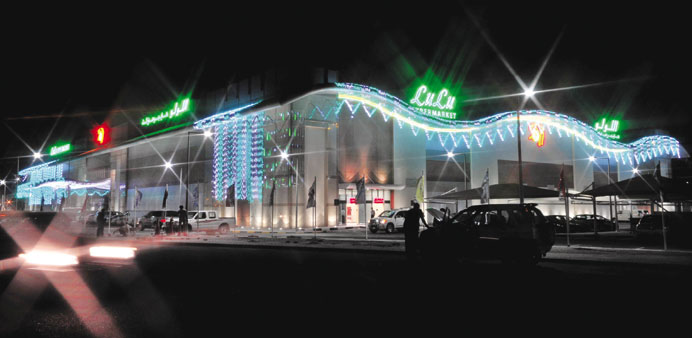LuLu Hypermarket has grown to a business empire with annual turnover of $5bn and some 30,000 employees. The chain retains more than 30% market share in its business segment in the Middle East.
By Arno Maierbrugger/Gulf Times Correspondent /Bangkok
LuLu Hypermarket, the largest supermarket chain in the Middle East and one of the world’s fastest growing, will for the first time enter the Southeast Asian market by opening an outlet in Malaysia’s capital Kuala Lumpur later in 2014, followed by five others over the coming years.
The news broke during a working visit of Malaysia’s Deputy Prime Minister Muhyiddin Yassin in Dubai between April 5 and 12 where he met senior officials of the retail company. According to Muhyiddin, the company will invest $200mn to commence operations in Malaysia, with the first store being located at Jalan Masjid India, a main road close to Kuala Lumpur’s city centre.
The local business partner of LuLu Hypermarket is Malaysia’s agro-business conglomerate Felda Holdings which will contribute the land bank for the stores and Malaysian products to the hypermarkets’ portfolio which will be entirely halal. In the long run, LuLu Hypermarket could open up to 10 outlets in Malaysia and employ around 2,000 Malaysians.
The minister said that the group has also agreed to sign contract farming deals with local farmers and entrepreneurs in Malaysia to help supply fresh vegetables and fruits to its hypermarkets, as well as with small and medium food producers. Malaysia is also eager to promote special indigenous products such as its highland vegetables from the Genting area, as well as tropical fruits and other specialties from Borneo and sell them through LuLu Hypermarket’s retail network in the Middle East.
Felda, for its part, said it will deliver products, which include sweet potato and organic vegetables, to be sold through LuLu in the GCC at prices higher than what they can command in Malaysia. Felda also said that it wants to market Malaysian products all over the Middle East, as its producers were all Muslims and the products are 100% halal and thus would fit perfectly into the market.
For that reason, the company said it is looking to attract business from other Middle Eastern supermarkets as well as retail companies and distributors, including from Qatar.
LuLu Hypermarket, which currently operates 110 outlets in the GCC and also in Yemen, Egypt and India, is part of Abu Dhabi-based Emke Group, a business empire led by India-born businessman MA Yousuf Ali. The group’s retail business has been on the rise ever since the 1990s when Ali opened his first hypermarket in Abu Dhabi in response to French retailer Carrefour entering the UAE market.
In the meantime, LuLu Hypermarket has grown to a business with annual turnover of $5bn and some 30,000 employees. The chain retains more than 30% market share in its business segment in the Middle East and employs the largest number of Indians outside India. The chain’s manufacturing and food processing bases are in India, Kenya, China and the UK.
In Qatar, LuLu Hypermarket presently runs 6 outlets that compete with Carrefour, Géant and Masskar.
A hypermarket is generally defined as a superstore combining food and grocery retail, a department store and other services such as money exchange and remittance services, as well as a food court, kids’ corner and ample parking space. The concept was first introduced in the US in the 1960s by superstore chain Fred Meyer and further developed by retail chains such as Wal-Mart, Kmart and Target, whereby French retail groups Carrefour and Géant brought it to the Middle East in the 1990s.

